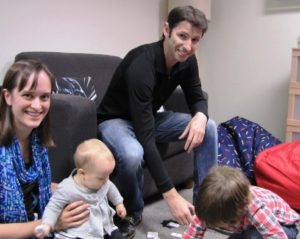
Letting babies cry themselves to sleep may not cause the emotional, behavioural or parent-child attachment issues many parents fret about, a new study led by Flinders University has found.
The study’s findings, published in the June edition of American Pediatrics, promises to help parents of babies with night-time sleep problems rest a little easier. It can also promote better sleep for babies.
Flinders University sleep expert, psychologist Associate Professor Michael Gradisar, says the research shows that controlled crying or ‘graduated extinction’ and another sleep education method called ‘bedtime fading,’ can actually improve babies’ and parents’ sleeping patterns.
In fact, the sleep training routines promise to provide bedtime-resistant infants with a better sleep without any adverse effects on families.
“It’s natural for parents to worry about having their babies cry at bedtime,” says Associate Professor Gradisar, senior lecturer at Flinders School of Psychology.
“While it’s well documented that sleep deprivation can cause family distress, including maternal depression, we’re hoping these results will add another element to how parents view their responses and how they manage their own and their babies’ sleep behaviour.”
While the two sleep education methods appear to improve sleep without detrimental effects on the child or family, Associate Professor Gradisar says more independent trials are required to validate the findings.
The two common infant sleep training interventions were conducted during a randomised controlled trial involving 43 infants who had night-time sleep troubles past about six months of age.
The babies were observed during the behavioural training methods of graduated extinction, as well as the “gentler” method called bedtime fading, in which parents gradually delay infants’ bedtime each night in the hope that sleepier babies will doze off more easily.
Compared to a control group, researchers reported that infants whose parents used the graduated extinction method fell asleep an average of 13 minutes sooner and woke up significantly less often during the night.
At the same time, there was no significant differences in stress levels based on salivary cortisol readings of the infants, parental stress or mood, or measurements of parent-child attachment.
But for parents who remain anxious about letting babies cry, Associate Professor Gradisar and colleagues said the bedtime-fading group showed nearly as large a decrease (10 minutes) in the amount of time it took for babies to fall asleep, although this group saw no change in the number of night-time awakenings compared to the control group.
Despite there being solid evidence of these psychological training improving infant sleep and maternal mood and stress, concerns about the short-term or long-term effects persist.
Yet at a 12-month follow-up, no significant differences were found in emotional and behavioural problems, or in attachment styles.
“A combination of using bedtime fading first, then moving on to graduated extinction could be another good approach,” Associate Professor Gradisar says.
“We hope parents of children 6-16 months can become more aware of bedtime fading which helps babies fall asleep at the start of the night.
“It may not resolve awakenings during the night so if a child is waking up several times a night, then there is now some more evidence that graduated extinction is a technique that may not be harmful to their child.”
Associate Professor Gradisar says parents can seek medical advice if they know in themselves whether their child has a sleep problem.
“If sleeplessness is associated with some form of daytime impairment, not just in the individual but also other family members, then this is an indication of a sleep problem.”
He says other methods, such as bed-sharing, were not included in the research due to safety risks.
However, room sharing with baby can be another option for introducing the sleep behaviour training.
Further instructions on controlled crying – when nocturnal cries are totally ignored by parents – and bedtime fading – when delays in parents’ response to baby’s cries are gradually extended – go to the Flinders University School of Psychology webpage here.
Research for the American Academy of Pediatrics paper, ‘Behavioral Interventions for Infant Sleep Problems: A Randomized Controlled Trial’ was conducted by South Australian academics Michael Gradisar, Kate Jackson, Joyce Kelly and Justine Whitman (Flinders University), Nicola Spurrier and Robyn Powell-Davies (SA Health) and Anne Sved Williams and David Kennaway (University of Adelaide and Women’s and Children’s Health Network). Read the paper at Pediatrics website here.
This research was registered at the Australian New Zealand Clinical Trials Registry (identifier ACTRN12612000813886) and supported by the Australian Rotary Health Fund, Channel 7 Children’s Research Fund and Flinders Faculty of Social and Behavioral Sciences.
NOTE – The Child and Adolescent Sleep Clinic at Flinders University is currently looking for participants in a current research project – for primary school and young adult (13-20 year old) sleep issues. Go to the link.

